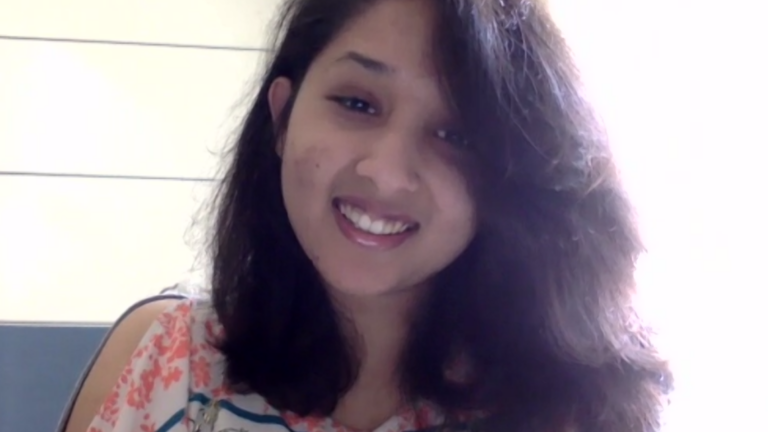Regional Studies, Student Engagement
Sonic Connections and Diasporic Belonging: Malayalam Radio in Qatar

Irene Promodh, a Georgetown University in Qatar (GU-Q) junior majoring in International Politics and a CURA Research Fellow, presented her research titled, “FM Radio and the Malayali Diaspora in Qatar: At Home Overseas” in a virtual CURA Focused Discussion on Tuesday, April 14, 2020. Promodh undertook this research project as part of the Certificate in Media and Politics (CMAP) program, which is offered jointly by GU-Q and Northwestern University in Qatar. She used a mixed-methods approach in conducting her research, deploying both semi-structured interviews with radio producers and listeners and media content analyses of the radio content broadcast itself. As such, “Malayalis” or speakers of the Malayalam language (the official language of Kerala, a state in South India) form the demographic focus of her research along the axes of gender, class, occupation, and family status.
Promodh traces the ways in which diasporic vernacular radio mediates the everyday lives of Malayali migrants in Qatar across both home and workspaces, particularly for single, lower-income, male, and female migrants. In Qatar, she deploys Radio Yatra FM [pseudonym used] as a case study in her project to examine the role of migrant radio along both radio production and listenership lines and its salience in the everyday work lives of Malayalis in Qatar. Promodh finds that Malayali radio audiences negotiate their “Malayali-ness,” or the ways of being Malayali, along gendered and socioeconomic lines through their engagement with diasporic vernacular radio. Paying attention to sonic waves and networks that bind together radio stations and audiences in Qatar across work and home spaces, she argues that diasporic vernacular radio both reinforces and challenges notions of “Malayali-ness” both within the Gulf Malayali community (bandham) and in non-Malayali urban workspaces in Qatar. Highly affordable and accessible, Promodh argues that radio uses migrant sabdam or “sound” to create and recreate spaces of sonic belonging, territorializing Malayalis’ workspaces along ethnolinguistic and exclusionary lines. She premises her findings, such as the one above, on her interview data with individuals ranging from Malayali beauticians at small salons and limousine drivers to library staff and, of course, radio station staff themselves.
Engaging with the scholarly works of Laith Ulaby, Neha Vora, and Fahad Bishara, among others, Promodh explores the cultural production histories of the western Indian Ocean and the formation of the Arabi-Malayalam language. She examines through ethnographic methods how the current socio-political realities that Malayalis in Qatar face transfigure Malayalam as a “migrant language” and its usage, which is regulated in the public sphere. Promodh observes the musical traditions associated with pearl-diving and shipbuilding, as well as other cross-cultural exchanges between India’s southwestern coast and the Persian Gulf, to explore the long-standing relationships between the two regions. While language in the past represented interconnectedness Promodh argues that today, “language is an exclusionary medium in the creation of non-physical space or, in effect, “soundscapes,” even along citizen-migrant lines, situating just the native speaker within.”
“Radio is central to diasporic Malayalis in Qatar as it creates a space of sonic belonging for them within the community.”
Promodh explores the interaction between the Malayali diasporic community and Radio Yatra, a prominent radio station in Qatar. She details how the 2017 Qatar Blockade transformed the diasporic radio scene in Qatar, bringing Radio Yatra to the forefront of the radio scene. Through her case study of this radio station, Promodh dictates the cross-sections between politics and media narratives which exist in trying to cater to the Malayali audience in Qatar. She argues that Radio Yatra is “central to diasporic Malayali life [because it creates a] sonic belonging . . . within the Malayali community.” She quotes Neha Vora, an anthropologist, to suggest that the Malayalis in Qatar experience a “state of permanent temporariness.”[1] The final segment of her presentation reiterates the gendered dynamics at play between radio jockeys and their audiences, as well as between the female jockeys themselves and their male managers. Through her interviews, she examines the professional realities of female radio jockeys, their workplace hierarchies, and their relationship with their male superiors. Promodh also explores the politics of the “ideal” Malayali family construct and how female Malayali radio jockeys construct and redefine their perceptions of womanhood and diasporic belonging according to norms associated with Malayali femininity and family life in the Kerala context.
In all, Promodh’s research deconstructs and demonstrates the symbolism of diasporic vernacular radio in the lives of Malayalis living in Qatar. Promodh concludes that Malayalis in Qatar experience “home away from the Kerala homeland via diasporic vernacular radio.” The radio, which may be perceived as an ordinary infotainment medium, accentuates the blurred nature of “work-leisure” boundaries and its profound role in the lives of the Malayali diaspora in Qatar. Through her empirical observations and findings, Promodh steers towards a refreshing narrative of migrant life in the Gulf beyond parochialisms of migrants as purely “labor.”
[1] Vora, Impossible Citizens: Dubai’s Indian Diaspora, 3.
_________________________________________________________________________________________________________________
Irene Promodh is a junior at GU-Q majoring in International Politics and is originally from South India. She works as a CURA Research Fellow and assists CIRS Director, Professor Mehran Kamrava, and Associate Director for Research Zahra Babar with their research centered on the region, while also working to advance the newly established CURA program. Her personal interests are rooted strongly in researching the dynamics of the media in influencing labor migration trends from South Asia to the Gulf, and she hopes to pursue further research in this field.
Article by Khushboo Shah, CURA Administrative Fellow